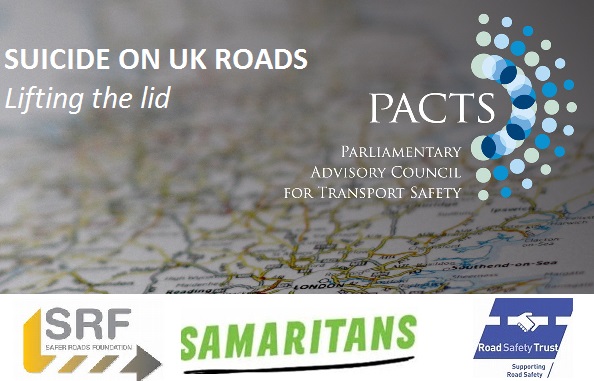A report published today (19th October 2017) by PACTS reveals how roads, vehicles and road infrastructure are being used by individuals seeking to end their lives in the UK.
PACTS has estimated that there are likely to be around 50 deaths each year by suicide on UK roads. It provides evidence that this is likely an underestimate of the true number.
In addition to the deaths, substantial numbers of suicide attempts are occurring in some areas and on major roads. Suicides and suicide attempts can have significant effects on other roads users, emergency services and highways authorities.
This issue is largely under-research and data and awareness are generally poor. The report identifies some positive initiatives underway, including a suicide prevention strategy by Highways England. Sweden has experience in this area from which the UK might learn. The report recommends
- clarification of ministerial responsibilities and identification of road-related suicide in official guidance;
- changes to the standard of proof required for a suicide conclusion by coroners (as previously recommended by the House of Commons Health Select Committee), and improved reporting by coroners;
- standardised incident recording by the police and others in cases where suicide or attempted suicide is suspected;
- closer working on this issue by public health, highways, emergency services and voluntary sectors; and
- a review of how suicides are recorded and retained in road casualty reports (STATS19).
Author of the report, PACTS policy officer Katy Harrison, says:
“Every incident of suicide on UK roads impacts on other road users and potentially puts the lives of other road users at risk. Incidents create delays on the network and the associated costs have serious repercussions for the UK economy. More importantly, behind every statistic is an individual and behind many of these deaths there is likely to be a family and a community devastated by their loss.
“In the rail sector, a wider cross-industry suicide prevention programme has been developed in order to tackle suicide on the railway network. Through a range of activity within the rail industry and in collaboration with local partners in health and social care, 1,811 people were prevented from taking their own lives through ‘life-saving’ inventions in 2016/17.”
“There is no official record of the number of suicides and attempted suicides taking place on roads in the UK every year and no central database for recording this information.
“In contrast to the rail sector and to mainstream road safety, there is an absence of information, research and concerted action to address the issue of road-related suicide. The highways community has yet to develop an approach to suicides or suicide prevention on the UK road network.”
The report can be read in full here.
The research project was undertaken in partnership with Samaritans and has been generously supported by the Road Safety Trust and Safer Roads Foundation.

